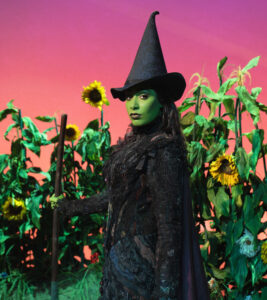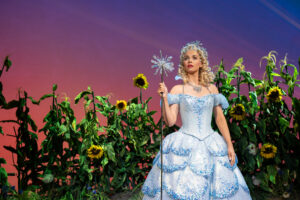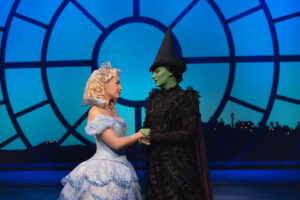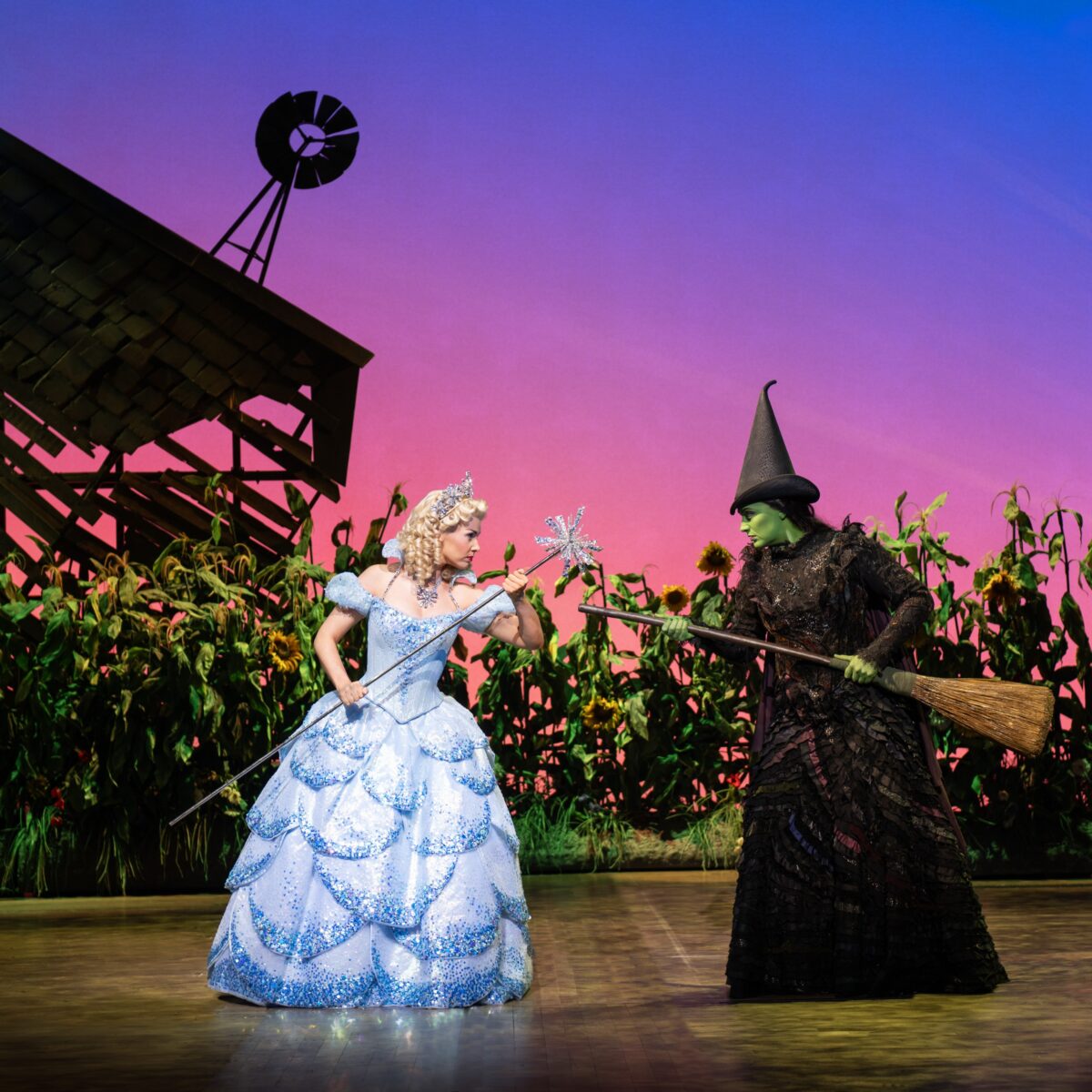Wicked, the spectacular, multi-record-breaking and critically acclaimed production, is set to fly back to the Mayflower Theatre stage from Thursday 23 May to Sunday 16 June 2024.
Wicked tells the incredible untold story of an unlikely but profound friendship between two young women – the popular Glinda and a misunderstood Elphaba – who first meet as sorcery students at Shiz University.
Following an encounter with The Wizard, their friendship reaches a crossroads, and their lives take very different paths.
Glinda’s unflinching desire for popularity sees her seduced by power while Elphaba’s determination to remain true to herself, and to those around her, will have unexpected and shocking consequences for her future.
We caught up with Sarah O’Connor, who plays Glinda, and Laura Pick, who plays Elphaba, ahead of the three-week run.
What is it like to star in a musical in which the two leads are played by women?
Sarah: “It’s amazing. It’s important to be telling stories where women are strong, independent and driven. For Glinda, it’s about where she wants to be in her career and becoming a better person. It’s important people can see that women can have that voice.”
Laura: “Wicked is two strong women making choices and leading this show. The responsibility we take on our shoulders as actors is that we, as two women, are the leads in this company. That’s pretty great.”

In the relationship that develops between Glinda and Elphaba, do you recognise your real-life friendships?
Laura: “Yes, in some ways. It helps that me and Sarah are getting on like a house on fire. That strengthens the bond between the characters. It makes any scene that’s feisty more real because you care about each other. When it comes to friendships in general, you can be friends with someone growing up and then never speak to them again. I’ve got someone I was inseparable from at school and then we just grew apart. Wicked explores how friendships can grow with age or circumstance.”
Sarah: “Relationships aren’t simple. They take time, effort and nourishment. There is a massive part of the story where Glinda and Elphaba aren’t with each other, but they are still thinking about each other and still in each other’s lives. There are parts of Glinda and Elphaba in us both. We’re not just one or the other. They represent all parts of you in two different people. That’s why they become such a force of nature. Their differences pull them together like polar opposites.”
Do you enjoy singing together?
Laura: “Yes, you really have to listen to each other. The first time we had to sing For Good together, both of us were tearing up. Looking into someone’s eyes you find a way to communicate without using words. You reassure the other one. There are moments that nobody would even know, but they’re there. You have to connect, blend and be cohesive – especially with For Good because it can be emotional and you have to support each other. Singing is such a special thing, especially when the voices sound nice together.”
Sarah: “Elphaba and Glinda are so different from each other vocally. Glinda is a soprano and Elphaba is epic. They are two very different vocal worlds to put together, so when it blends it can be magic. I spend the whole musical listening to Laura singing and she is just ridiculously good, but when we get to For Good we’re thinking more about story. She’s telling her part of the story, now it’s my turn to tell my part.”
Do you see your younger selves in Wicked’s coming-of-age story – the sense of finding a place and an identity as you grow up?
Laura: “Yes. I’m only realising as I get older how much I struggle going into groups with big personalities. I was anxious the day before starting rehearsals, not about doing the job but about all these new people I was going to meet. We all, at some point in our lives, feel like an outsider. Elphaba turns up at school thinking, “Right, I’m going to be accepted here,” but she is not. I’ve never experienced anything to that level but we all sometimes feel we don’t fit in. That’s why so many people connect with the show and so many people come night after night. It is their safe space and they feel seen.”
Sarah: “That’s such an important thing about theatre. It is a safe space to feel creative and to escape. When you’re creative you tend to stand out because you’re all over the place thinking of something new and you don’t quite know how to fit in. That doesn’t feel particularly nice. But every character has something we can identify with: Doctor Dillamond being an animal they want to get rid of or Madame Morrible who looks confident but is trying to get to the top and feel accepted. Glinda is pretending she’s absolutely fine but she doesn’t know who she is. She thinks she’s one thing and becomes another, and she needs Elphaba to bring it out.”
Have you ever disliked someone you later came to like?
Sarah: “I’m usually the other way around: I like everyone until I’m proved wrong.”
Laura: “I had a girl at school who couldn’t stand me. She thought I was so annoying. Then one day, I’d hurt my foot and I was off and she ended up coming round. We clicked. We were 14 and we’re still friends. People can assume you’re one way and they’re never going to like you but you can prove them wrong. If you’re a good person, you’re a good person.”

Do your own friends change you in the way the characters in Wicked change each other?
Sarah: “Friends can change your views on things. They can form you into a slightly different person. You teach each other, learn from each other, give each other confidence, encourage each other to go for that job or do that travelling. They’re all smaller things than, “I’m going to give you confidence to be who you want to be and now I’m going to take over a whole city!” But yes, the people in my life do things for me and I grow from them, for sure.”
Laura: “I’ve had people who are new influences in my life teaching me to stand up for myself and to just be me. You do get onto paths where you’re not being your true self, but who you are is good enough and you need to believe that. Knowing my worth has been a real change for me recently and I’ve had people show me that.”
Is it interesting to play a baddie who is not all bad and a goodie who is not all good?
Laura: “Yes, because it’s got layers. It must get boring if you were playing someone who’s nicey-nice all the time. Nobody is that nice. Nobody is that perfect. We all have skeletons in our closets – a part of you that you battle with, thinking, “I wish I didn’t feel like that.” It’s so good to explore all the avenues of these roles and get across the truth.”
Sarah: “Their names are the Wicked Witch of the West and Glinda the Good and yet they’re neither of those people. They are titles that have been given to us to make it easier for people to go, “Yes,” or “No”. it’s enjoyable to be playing characters that have more to them than just beige.”
How do you respond to Wicked’s theme about excluding people who are different, whether it is Elphaba for being green or her sister, Nessarose, for being a wheelchair user?
Sarah: “Wicked was before its time. It’s one of the reasons it’s been running on Broadway for 20 years and nearly the same length here. Thank God these things are being discussed now and acceptance is being normalised, be it disabilities, looking different or feeling different. We’re putting a mirror in front of people and going, “How are you treating these people? How are you making other people feel?””
Laura: “You can come to Wicked and think, “What a good show, what amazing songs,” but if you take in those storylines, it can make you think.”

What are your favourite songs to sing?
Laura: “I love doing For Good because I love the connection, but I also love singing Defying Gravity because it’s the end of act one, Elphaba is going, “What I thought I wanted can’t happen any more and I have to do something.” That’s her soaring – literally – and saying, “This is me now.” As well as it being an audience pleaser, it feels powerful and if you feel it through your body it is such an amazing song to sing.”
Sarah: “If it’s for absolute fun, I’d choose Popular – it’s great craic. What Is This Feeling? feels nice and juicy and you can get angry with each other. For Good is incredible. And then you have Thank Goodness, which is my emotional gem. When I’m not singing, I listen to Laura singing No Good Deed and it’s the best song ever.”
Tickets for Wicked (23 May – 16 June 2024) are on sale at mayflower.org.uk or 02380 711811.
- In Common is not for profit. We rely on donations from readers to keep the site running. Could you help to support us for as little as 25p a week? Please help us to carry on offering independent grass roots media. Visit: https://www.patreon.com/incommonsoton

